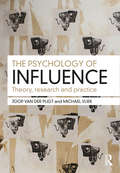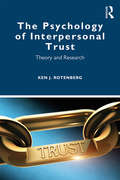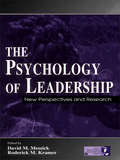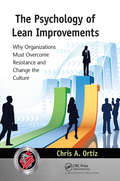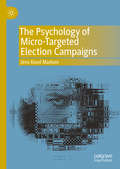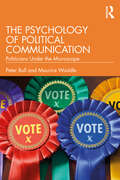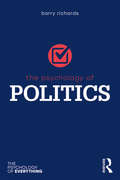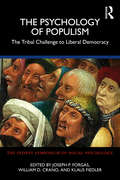- Table View
- List View
The Psychology of Influence: Theory, research and practice
by Joop Van Pligt Michael VliekWhether it’s our choice of a new car or what we think about our neighbours, our opinions and attitudes are a way of negotiating the world around us. The Psychology of Influence explores how these preferences and behaviours are influenced and affected by the messages we receive in daily life. From consumer choices to political, lifestyle and financial decisions, the book examines how and why we may be influenced by a range of sources, from written text and television to social media and interpersonal communication. In a field that has fascinated scholars since Plato, the book addresses the key questions across cognitive, social and emotional domains: When do arguments become persuasive? What influence do role models have? What role do simple rules of thumb, social norms or emotions play? Which behaviours are difficult to influence, and why? Covering topics from attraction, prejudice and discrimination to reward, punishment and unconscious bias, The Psychology of Influence will be invaluable reading for students and researchers across a range of areas within applied and social psychology, as well as those in political science, communications, marketing and business and management.
The Psychology of Innovation in Organizations
by David H. Cropley Arthur J. Cropley Cropley, David H. and Cropley, Arthur J.In today's highly competitive market, organizations increasingly need to innovate in order to survive. Drawing on a wealth of psychological research in the field of creativity, David H. Cropley and Arthur J. Cropley illustrate practical methods for conceptualizing and managing organizational innovation. They present a dynamic model of the interactions between four key components of creativity - product, person, process, and press - which function as building blocks of innovation. This volume sheds new light on the nature of innovative products and the processes that generate them, the psychological characteristics of innovative people, and the environments that facilitate innovation. It also fills a significant gap in the current literature by addressing the paradoxical quality of organizational innovation, which may be both helped and hindered by the same factors. The authors demonstrate that with proper measurement and management, organizations can effectively encourage individuals to produce and take advantage of novel ideas.
The Psychology of Insecurity: Seeking Certainty Where None Can Be Found (Sydney Symposium of Social Psychology)
by Klaus Fiedler William D. Crano Joseph P. ForgasInsecurity is an inevitable part of being human. Although life is insecure for every organism, humans alone are burdened by knowing that this is so. This ground-breaking volume features contributions by leading international researchers exploring the social psychology of insecurity and how existential, metaphysical, and social uncertainty influence human social behaviour. Chapters in the book investigate the psychological origins of insecurity, evolutionary theorizing about the functions of insecurity, the motivational strategies people adopt to manage insecurity, self-regulation strategies, the role of insecurity in the formation and maintenance of social relationships, and the influence of insecurity and uncertainty on the organization of larger social systems and public affairs. The chapters also discuss how insecurity influences many areas of contemporary social life, highlighting the applied implications of this line of research. Topics covered include the role of insecurity in social communication, social judgments, decision-making, group identification, morality, interpersonal behaviour, relationships, attitudes, and many applied aspects of social life and politics where understanding the psychology of insecurity is of critical importance. This accessible and engaging book will be of interest to students, researchers, and practitioners as a textbook or reference book in behavioural and social science fields, as well as to a broad spectrum of intelligent lay audiences seeking to understand one of the most intriguing issues that shapes human social life.
The Psychology of Interpersonal Behaviour
by Michael ArgyleThe first edition of this book outlined what amounted to a breakthrough in the analysis of social behaviour. Since then it has become widely used as an introductory textbook of social psychology. It is invaluable to anyone interested in the subject or whose work involves dealing with people, as well as anyone who wants to know how to make friends and influence people. For this new, fifth edition, Michael Argyle includes the latest research on non-verbal communication, social skills and happiness.
The Psychology of Interpersonal Relations
by F. HeiderPublished in the year 1982, The Psychology of Interpersonal Relations is a valuable contribution to the field of Social Psychology.
The Psychology of Interpersonal Trust: Theory and Research
by Ken J. RotenbergTrust is a crucial facet of social functioning that feeds into our relationships with individuals, groups, and organizations. The Psychology of Interpersonal Trust: Theory and Research examines existing theories, frameworks, and models of trust as well as the methods and designs for examining it. To fully examine how interpersonal trust impacts our lives, Rotenberg reviews the many essential topics trust relates to, including close relationships, trust games, behavioural trust, and trust development. Designed to encourage researchers to recognize the links between different approaches to trust, this book begins with an overview of the different approaches to interpersonal trust and a description of the methods used to investigate it. Following on from this, each chapter introduces a new subtopic or context, including lying, adjustment, socialization, social media, politics, and health. Each subtopic begins with a short monologue (to provide a personal perspective) and covers basic theory and research. Rotenberg’s applied focus demonstrates the relevance of interpersonal trust and highlights the issues and problems people face in contemporary society. This is essential reading for students, researchers, and academics in social psychology, especially those with a specific interest in the concept of trust.
The Psychology of Job Interviews
by Nicolas RoulinMost people, at some point in their lives, experience the stress of being interviewed for a job they want. Many also face the challenge of interviewing other people. But what does the science tell us about this unique social situation? What biases are involved, and how can we become aware of them? And how can job interviews be structured so that they are fair and effective? The Psychology of Job Interviews is the first book to provide an accessible and concise overview of what we know. Based on empirical research rather than second hand advice, it discusses the strategies and tactics that both applicants and interviewers can use to make their interviews more successful; from how to make a good first impression to how to decide which candidate is the best fit for the role. Illustrated with examples throughout, the book guides job applicants on how best to prepare for and perform in an interview, and provides managers with best-practice advice in selecting the right candidate. Debunking several popular myths along the way, this is essential reading for anyone interested in understanding what is really happening in a job interview, whichever side of the desk you are sitting.
The Psychology of Job Interviews
by Nicolas RoulinMost people, at some point in their lives, experience the stress of being interviewed for a job. Many also face the task of interviewing other people. But what does the science tell us about this unique social situation? What biases are involved, and how can we become aware of them? And how can job interviews be structured so that they are fair and effective? This second edition of The Psychology of Job Interviews provides an accessible and concise overview of what we know. Based on empirical research rather than secondhand advice, it discusses the strategies and tactics that both applicants and interviewers can use to make their interviews more successful; from how to make a good first impression to how to decide which candidate is the best fit for the role. Updated throughout, this timely new edition comes with an additional chapter focused on technology in interviewing. Also featuring the addition of a new "Toolbox" at the end of chapters with practical summaries, tools, advice, and concrete examples, the book guides job applicants on how best to prepare for and perform in an interview and provides managers with best-practice advice in selecting the right candidate. Debunking several popular myths along the way, this is essential reading for anyone interested in understanding what is really happening in a job interview, whichever side of the desk you are sitting.
The Psychology of Justice and Legitimacy (Ontario Symposia on Personality and Social Psychology Series)
by James M. Olson Mark P. Zanna D. Ramona Bobocel Aaron C. KayIn response to the international turmoil, violence, and increasing ideological polarization, social psychological interest in the topics of legitimacy and social justice has blossomed considerably. Social psychologists have explored the psychological underpinnings of people’s reactions to injustice and illegitimacy, including the behavioral and psychological consequences of the motivation to view individual outcomes and governmental systems as just and legitimate. Although injustice and illegitimacy are clearly related at conceptual and theoretical levels, these two rich literatures are rarely integrated. Social justice researchers have focused on how people make sense of particular instances of injustice, whereas legitimacy researchers have tended to focus primarily on people’s reactions to unfair systems of intergroup relations. This 11th volume of the Ontario Symposium series brings together the work of leading researchers in fields of social justice and legitimacy to facilitate the cross-pollination and integration of these fields. The contributions address broad theoretical issues and cutting-edge empirical advances, while illustrating the diversity and richness of research in the two fields. By uniting these two domains, this volume will stimulate new directions in theory and research that seek to explain how and why people make sense of injustice at all levels of analysis.
The Psychology of Leadership: New Perspectives and Research (Organization and Management Series)
by Roderick M. Kramer David M. MessickIn this book, some of the world's leading scholars come together to describe their thinking and research on the topic of the psychology of leadership. Most of the chapters were originally presented as papers at a research conference held in 2001 at the Kellogg School of Management of Northwestern University. The contributions span traditional social psychological areas, as well as organizational theory; examining leadership as a psychological process and as afforded by organizational constraints and opportunities. The editors' goal was not to focus the chapters on a single approach to the study and conceptualization of leadership but rather to display the diversity of issues that surround the topic.Leadership scholars have identified a host of approaches to the study of leadership. What are the personal characteristics of leaders? What is the nature of the relation between leaders and followers? Why do we perceive some people to be better leaders than others? What are the circumstances that evoke leadership qualities in people? Can leadership be taught? And so on. The contributions to this book examine these important questions and fall into three categories: conceptions of leadership, factors that influence the effectiveness of leadership, and the consequences and effects of leadership on the leader. All in all, the chapters of this volume display part of a broad spectrum of novel and important approaches to the study of the psychology of leadership. We hope that they are equally useful to those who are or would be leaders and to those who study the topic. As recent events have served to remind us, it is too important a topic to be ignored by psychologists.
The Psychology of Lean Improvements: Why Organizations Must Overcome Resistance and Change the Culture
by Chris A. OrtizFear of change we all experience it. Some accept change immediately, some gradually adapt, while others may never get there. Whether it‘s poor leadership, the inability to change, or pure ego, this Shingo Prize-winning book explores this perplexing commitment to inefficiency.Winner of a 2013 Shingo Prize!The Psychology of Lean Improvements: Why Org
The Psychology of Liberty: Reclaiming Everyday Freedom
by Barbara A. KerrThis book introduces a new concept of liberty, based on the idea that being free means being the humans we evolved to be in our first 200,000 years. With perspectives from psychology, anthropology, and sociology, the author shows how throughout history, dominant individuals and status hierarchies have injured our psychological and physical well-being. Readers discover simple behaviors that make humans feel free (like gossiping, playing, making, and storytelling) and are prompted to a compelling reflection threats to this freedom. Psychology of Liberty: Reclaiming Everyday Freedom explores the dynamics of creative families, communities, and societies, showing how they sustain human freedom. The author identifies new pathways to freedom, drawing from examples of resistance to authoritarianism. In this timely and ambitious book, the author combines personal narrative with academic research to make complex ideas accessible.
The Psychology of Micro-Targeted Election Campaigns
by Jens Koed MadsenThis book examines the psychology behind micro-targeted tactics used in election campaigning and the advent of increasingly sophisticated dynamic Agent-Based Models (ABMs). It discusses individual profiling, how data and modelling are deployed to enhance the effectiveness of persuasion and mobilization efforts in campaigns, and the potential limitations of these approaches. Madsen particularly explores how psychological insight and personal data are used to generate individualised models of voters and how these in turn are applied to optimise persuasion strategies tailored to a specific person. Finally, the book considers the broader democratic dilemmas raised by the introduction of these tactics into politics and the critical civic importance of understanding how these campaigns function.This timely work offers fresh insights for students and scholars of political psychology, philosophy, political marketing, media, and communications.
The Psychology of Misinformation (Contemporary Social Issues Series)
by Jon Roozenbeek Sander van der LindenKing Charles III is Dracula's distant cousin. Governments are hiding information about UFOs. COVID-19 came from outer space. These sound like absurd statements, but some are true, and others are misinformation. But what exactly is misinformation? Who believes and spreads things that aren't true, and why? What solutions do we have available, and how well do they work? This book answers all these questions and more. Tackling the science of misinformation from its evolutionary origins to its role in the internet era, this book translates rigorous research on misleading information into a comprehensive and jargon-free explanation. Whether you are a student, researcher, policymaker, or changemaker, you will discover an easy-to-read analysis on human belief in today's world and expert advice on how to prevent deception.
The Psychology of Multiculturalism, Assimilation, and Omniculturalism: Managing Diversity in Global Context (SpringerBriefs in Psychology)
by Fathali M. MoghaddamThis book provides, from a psychological perspective, a concise critical introduction to, and assessment of, three different approaches to managing diversity: multiculturalism, assimilation, and omniculturalism. This task is undertaken in global context and with reference to cutting edge empirical psychological research. Historically, assimilation has been the dominant approach to managing diversity. However, since the late 1960s multiculturalism has gained favor and is now the most commonly adopted approach in most Western as well as in some non-Western societies. Both assimilation and multiculturalism rest on some central psychological assumptions that are not supported by empirical research. After critically reviewing the psychological foundations of assimilation and multiculturalism, it is argued that we need to explore new approaches to managing diversity in the twenty-first century. A number of contemporary research programs, such as those related to social identity theory and the common group identity model, point to omniculturalism as a more promising approach to managing diversity. Also, global warming, nuclear proliferation and other major challenges confronting humankind suggest that a diversity management approach that gives priority to human commonalities and universal rights is better suited to our contemporary needs.
The Psychology of Music (Psychology Revivals)
by John Booth DaviesWhat happens when we listen to music? Why are certain forms pleasing and others not? John Davies was both a psychologist and a talented musician and The Psychology of Music, originally published in 1978, explores the nature of man’s eternal need for, and love of, music. Drawing on current research in psychology and social psychology at the time, he explores the processes beneath this love affair in an easy and fluent style liberally punctuated with amusing and, occasionally, startling examples.
The Psychology of Music Listening for Health and Wellbeing Professionals
by Katrina Skewes McFerran Carol Barbara LotterThis book comprehensively reviews wide-ranging research describing the uses of music listening for health and wellbeing outcomes. Drawing on the work of diverse professionals from around the globe, the authors provide engaging illustrations of using music with people in practice, combined with recommendations from their many years of applied practice in hospitals, schools, community organisations, and universities as music therapists, researchers and educators.Knowledge has been gathered into accessible chapters so that professionals can identify their own area of interest and go directly to it. This includes music listening for flourishing during difficult times, during life transitions, for stress in everyday life, problematic music listening, music listening for mental ill health and trauma, in acute hospital settings, for neurocognitive impairment, in rehabilitation and special education, for optimising performance, and in groups. A book for professionals who want to be informed by the latest research and expertise when using music listening in their work.
The Psychology of Negotiations in the 21st Century Workplace: New Challenges and New Solutions (SIOP Organizational Frontiers Series)
by Barry M. Goldman Debra L. ShapiroThe "litigation explosion" in the 21st century workplace means increasing costs and risks of lawsuits. Negotiation appears the attractive alternative to litigation. This new volume, with contributions from experts in psychology, management, and other disciplines, bridges the gap between management and negotiation research. Managers, students, and researchers interested in the field of negotiation will find this new book in SIOP’s Organizational Frontiers series of interest.
The Psychology of Organizational Change
by Shaul Oreg Alexandra Michel Rune Todnem By Shaul Oreg Alexandra MichelIn a rapidly changing world, with constantly shifting dynamics, organizational change may prove essential if businesses are to continue to succeed. The majority of research on organizational change adopts a macro outlook, focusing on strategic issues from the perspective of the organization and its management. In this volume we undertake a micro perspective, focusing on the individual and, more specifically, the importance of the employees and their reactions to organizational change. This focus expands our understanding of why change initiatives frequently fail. The Psychology of Organizational Change constitutes an essential resource for scholars, students, and practitioners in the field of organizational change and development who strive to understand how to make change work not only for the organization, but also for its members.
The Psychology of Planning in Organizations: Research and Applications (Organization and Management Series)
by Michael D. Mumford Michael FreseThis book examines planning as the critical influence on performance at work and in organizations. Bridging theory and practice, it unites cutting-edge research findings from cognitive science, social psychology, industrial and organizational psychology, strategic management, and entrepreneurship, and describes the practical applications of these research findings for practitioners interested in improving planning performance in organizations.
The Psychology of Political Communication: Politicians Under the Microscope
by Peter Bull Maurice WaddleContemporary politics is mass-communication politics. Politicians are not only seen and heard, they are seen and heard in close-up through television appearances, speeches, interviews, and on social media. In this book, the authors analyse the ways in which politicians communicate with each other, the media, and the electorate; they also discuss the implications of contemporary political discourse on the democratic process as a whole. Politicians in interviews are typically castigated for their evasiveness. However, microanalytic research shows that there is more to political discourse than this apparent ambiguity. This book reveals how equivocation, interruptions, and personal antagonism can offer valuable insights into a politician’s communicative style. The authors review their empirical research not only on political interviews, but also on speeches, parliamentary debates, and political journalism. Further insights include how political speakers interact with their audiences, how party leaders engage in adversarial discourse at PMQs, and how the spoken messages of politicians can be affected by modern journalistic editing techniques. Thereby, this research generates greater awareness of communicative practices in a diverse range of political contexts. While the interviews and parliamentary debates analysed pertain to UK politics, the speeches also draw on the USA, and European and Far Eastern nations. This engaging book is a fascinating resource for students and academics in psychology, politics, communication, and other related disciplines such as sociology and linguistics. The research is also extremely relevant to policy makers and practitioners in politics and political journalism.
The Psychology of Political Polarization
by Prooijen, Jan-Willem vanThe Psychology of Political Polarization was inspired by the notion that, to understand the momentum of radical political movements, it is important to understand the attitudes of individual citizens who support such movements. Leading political psychologists have contributed to this important book, in which they share their latest ideas about political polarization – a complex phenomenon that cannot be traced back to a single cause, and that is associated with intolerance, overconfidence, and irrational beliefs. The book explores the basis of political polarization as being how citizens think and feel about people with a different worldview, how they perceive minority groups, and how much they trust leaders and experts on pressing societal issues such as climate change, health, international relations, and poverty. The chapters are organized into two sections that examine what psychological processes and what social factors contribute to polarization among regular citizens. The book also describes practical strategies and interventions to depolarize people. The book offers a state-of-the-art introduction to the psychology of political polarization which will appeal to the academic market and political professionals.
The Psychology of Politically Unstable Societies (Global Perspectives in Political Psychology)
by Anna Kende Barbara LášticováThis volume presents the latest developments in the field of political psychology by exploring the psychological processes that underlie political instability and how these can be addressed with psychological interventions. Written by a team of international leading researchers, the book critically re-evaluates the relevance of concepts primarily developed in WEIRD (Western, Educated, Industrialized, Rich and Democratic) contexts, for non-WEIRD societies. It focuses particularly on East-Central Europe and South Africa, showing how they enjoy some privileges of WEIRD countries but are also characterized by a troubled history and relative deprivation. Covering psychological concepts such as political trust, conspiracy thinking, authoritarianism, populism, autochthony, social identity and prejudice, the chapters illustrate that psychology has the tools to explain the recurring and shared problems of these societies. This original book is ideal for scholars and students in social psychology, political science and social science. It will also be useful reading for policy makers, political analysts and anyone who wishes to understand their role in creating more stable and more just societies.
The Psychology of Politics (The Psychology of Everything)
by Barry RichardsHow do some political leaders capture popular support? What is the appeal of belonging to a nation? Can democracy thrive? The Psychology of Politics explores how the emotions which underpin everyday life are also vital in what happens on the political stage. It draws on psychoanalytic ideas to show how fear and passion shape the political sphere in our changing societies and cultures, and examines topical social issues and events including Brexit, the changing nature of democracy, activism, and Trump in America. In a changing global political climate, The Psychology of Politics shows us how we can make sense of what drives human conduct in relation to political ideas and action.
The Psychology of Populism: The Tribal Challenge to Liberal Democracy (Sydney Symposium of Social Psychology)
by Klaus Fiedler William D. Crano Joseph P. ForgasThe recent rise of populist politics represent a major challenge for liberal democracies. This important book explores the psychological reasons for the rise of populism, featuring contributions from leading international researchers in the fields of psychology and political science. Unlike liberal democracy based on the Enlightenment values of individual freedom, autonomy and rationality, both right-wing and left-wing populism offer collectivist, autocratic formulations reminiscent of the evolutionary history and tribal instincts of our species. The book offers a comprehensive overview of the psychology of populism, covering such phenomena as identity seeking, anger and fear, collective narcissism, grievance, norms, perceptions of powerlessness and deprivation, authoritarianism, nationalism, radicalism, propaganda and persuasion, ethnocentrism, xenophobia and the effects of globalization. The book is divided into four parts. Part I deals with the motivational and emotional factors that attract voters to populist causes, and the human needs and values that populist movements satisfy. Part II analyzes the cognitive features of populist appeals, especially their emphasis on simplicity, epistemic certainty and moral absolutism. Part III turns to one of the defining features of populism: its offer of a powerful tribal identity and collectivist ideology that provide meaning and personal significance to its followers. Finally, in Part IV, the propaganda tactics used by populist movements are analysed, including the role of charismatic leadership, authoritarianism, and nationalism and the use of conspiracy narratives and persuasive strategies. This is fascinating reading on a highly topical issue. The book will be of interest to students, researchers, and applied professionals in all areas of psychology and the social sciences as a textbook or reference book, and to anyone interested in the global rise of populism.
